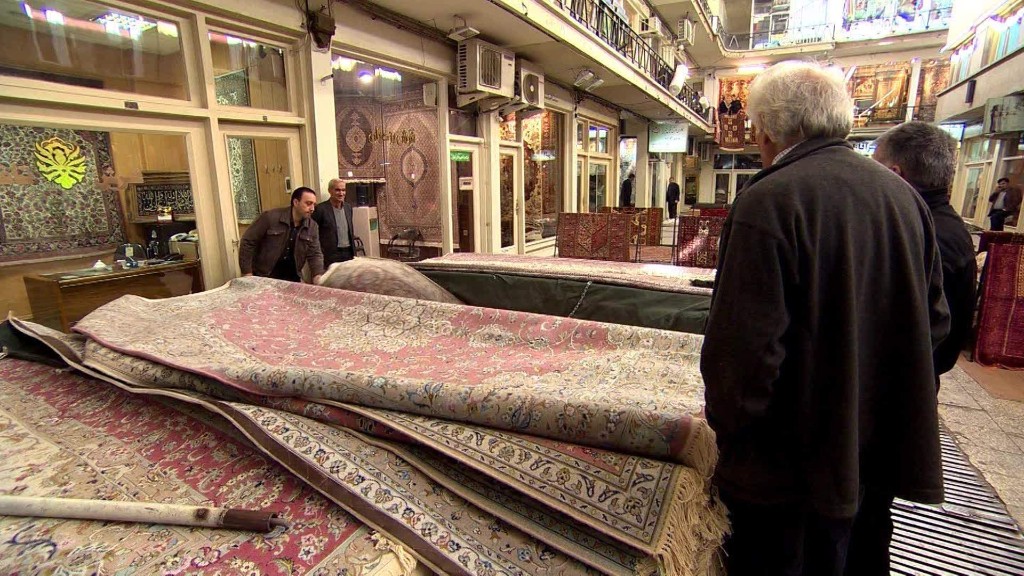
2016 was supposed to be Iran's breakout year. Now that's in jeopardy.
Iran and Saudi Arabia have started feuding again just as Iran is trying to prove to the world it isn't building nuclear bombs and that it's ready to reenter the global economy after decades of painful sanctions.
Any military escalation would be costly, but here are four ways Iran is already in danger economically.
1. Possible delay in lifting sanctions on Iran
The key to Iran's renaissance is the West lifting sanctions. Iran has basically been in an economic "time out" since the U.S. sanctions of 1979, which made it difficult for Iran to sell its oil, art and other goods around the world.
"Tehran needs Washington to reach its full economic potential, and the U.S. needs Iran to resolve major conflicts in the region," said Majid Rafizadeh, a Middle East scholar at Harvard.
The landmark nuclear deal that Iran signed with the P5+1 (the U.S., U.K, Germany, France, Russian and China) was built on a simple premise: Iran agrees to open up its nuclear facilities for inspection and monitoring in exchange for international sanctions being lifted.
There's just one problem for Iran: the Implementation Date for the deal hasn't been set yet. That's the day the sanctions will actually end.
The International Atomic Energy Agency gets to choose the date after it deems Iran has passed inspections. There was speculation the sanctions could come off as early as January, but the agency may hesitate given the latest tensions.
Related: Iran offers huge economic potential. Can it deliver?
2. Oil prices tanking further
Iran is watching the price of oil closely. It's no secret that Iran can't wait to start selling its oil on the global market again. But it won't be the cash cow Iran's leaders want. Oil prices hit a seven-year low this week.
Iran and Saudi Arabia hold a quarter of the world's known oil reserves. They are the dominant players in OPEC. If they joined forces to cut back oil production, it would likely send oil prices soaring. But right now, the two foes want to do anything they can to hurt each other.
"Saudi Arabia and Iran are less likely to cooperate with the other to support prices. Consequently, oil prices may plummet even lower," said Giorgio Cafiero, CEO of Gulf State Analytics, a geopolitical risk consultancy.
That's good for drivers, but not for the Iran and Saudi government budgets. Saudi Arabia is running out of cash and slashing benefits for its citizens. Iran needs the price of oil to be above $70 a barrel to balance its budget, according to the IMF.
Related: Saudi, Iran conflict would send oil prices skyrocketing, but...
3. Iran's top trading partners aren't happy
Saudi Arabia wasn't the only country to cut diplomatic ties with Iran after some Iranians torched the Saudi Embassy in Tehran. Bahrain and Sudan followed suit.
The United Arab Emirates, one of Iran's largest trading partners, didn't go quite as far but it "downgraded" relations with Iran, meaning it withdrew its ambassador and just left lower level diplomats. Kuwait also recalled its ambassador from Iran.
A government statement said the UAE "has taken this exceptional step in light of Iran's ongoing interference in internal (Gulf Cooperation Council) and Arab affairs that has recently reached unprecedented levels."
While Iran hopes to open up to the world in 2016, it will still need its regional trading partners. Foreign businesses are likely to use places like the UAE as hubs to expand into Iran. That gets complicated if the two countries aren't on good terms.
4. The U.S. is unlikely to lift more sanctions
Lastly, there's the U.S. factor. The vast majority of American sanctions will remain in place on Iran even after Implementation Day.
U.S. businesses will still find it difficult to trade with Iran, let alone set up physical stores or offices in Iran. In most cases, they will need a special waiver from the U.S. Treasury to even send American goods to Iran.
The Obama administration is unlikely to expand trade while Iran is talking about "divine revenge" against U.S. ally Saudi Arabia.
Iran has also become a talking point on the 2016 campaign trail with Republicans and Democrats taking a hard stance.
"The biggest test is not whether this nuclear deal will get repealed but what is the next president's position on Iran. That will shape a lot of things," says Farhad Alavi of the Akrivis Law Group, that works with companies seeking waivers to do business in Iran.
-- CNNMoney's Matt Egan contributed to this report.


